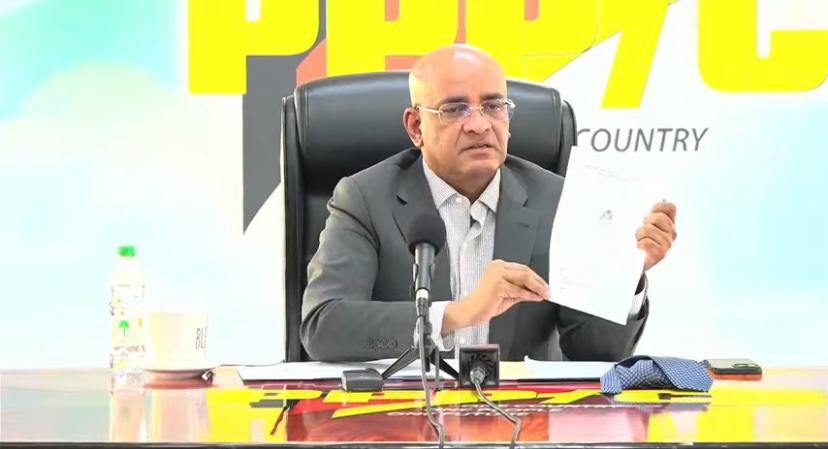Vice President Bharrat Jagdeo on Thursday clarified that while no “special” legislation will be put in place for the planned $100,000 disbursement to all adults it will be covered by a supplementary appropriation in Parliament.
“I said we are not going to pass a special act called (a) cash grant act. If we had to do that we would have had to pass one for the business grant and everything. It is all covered under the FMAA and also under these special acts that emanate from the constitutional process of appropriating funds. So they have legislative approval. The 60 billion (dollars) or whatever it comes up to (for the $100,000 grant) will go to the parliament; there will be a full debate there, and then once it’s passed it will be put into a supplementary act, assented to by the president, published in the Official Gazette, and then the funds would be available”, he said at a press conference.
He stated that the expectation of several persons might have been that special legislation might have had to be put in place for the disbursement of the fund. He added that the disbursement of funds from the Consolidated Fund is covered under the Fiscal Management and Accountability Act (FMAA) of 2003.
“Every person knows that to give effect to the constitutional provision there is a piece of legislation, a special act that was passed. The last version of the Fiscal Management and Accountability Act was passed in 2003, and it set out exactly how public money should be spent and should be appropriated,” Jagdeo said.
Giving more details on withdrawals from the public’s purse, he added that “every time you pass a budget you go to the parliament to appropriate the funds. But when the budget is passed you cannot withdraw the funds until you have the legislative authority to do so. Also, there is an act that is assented to by the president that gives you the right to do so. President (Irfaan) Ali assented to it. It sets out all of the money appropriated by parliament; there are pages of it for every ministry. It is gazetted. There is a special act from which the Ministry of Finance uses to withdraw money from the Consolidated Fund. You have to pass it here. If there is a supplementary, during the course of the year, like this one here, supplementary appropriation act (is) assented to again by President Ali. So you can’t spend a cent. The 60 billion (dollars) can’t fall from the sky. As I said before, you have to appropriate it. It means parliamentary oversight. They said no parliamentary oversight. You have to go to the parliament to appropriate the money. So that means debate in the parliament. You request a supplementary provision, you debate it in the parliament, parliamentary oversight, it gets passed, and even when it gets passed you cannot withdraw the funds as yet. You have to gazette it, and it has to be assented to by the president. This is a special legislative act,” Jagdeo said, holding the document in his hand.
According to Section 18 of the FMAA of 2003, “No sums shall be withdrawn from the Consolidated Fund except under the authority of a warrant addressed to the Accountant General under the hand of the Minister.”, and that “In order to defray unforeseen and urgent expenditure for which no other provision exists, the Minister may establish a Contingencies Fund by issues from the Consolidated Fund not exceeding in the aggregate five hundred thousand dollars or such greater sum as the National Assembly may approve.” And that “Supplementary estimates of such expenditure shall be submitted for the approval of the National Assembly as soon as possible.”
At his press conference on October 30th, Jagdeo had argued that legislative oversight could lead to rigid recurrent expenditures, potentially hindering government flexibility in times of economic downturn, adding that the government can be stuck with big recurrent expenditures, especially if oil prices were to decline.
The government settled on providing a cash grant of $100,000 to every Guyanese over the age of 18, including those resident overseas, who would have to be in the country at the time of distribution to collect it. To be eligible for the grant, recipients will have to show proof of Guyanese citizenship by way of a national identification card or Guyana passport. The modalities for payment are being worked on, and the payout process, because of the logistics of the country, could begin soon but take up to the first quarter of next year to be completed.\






